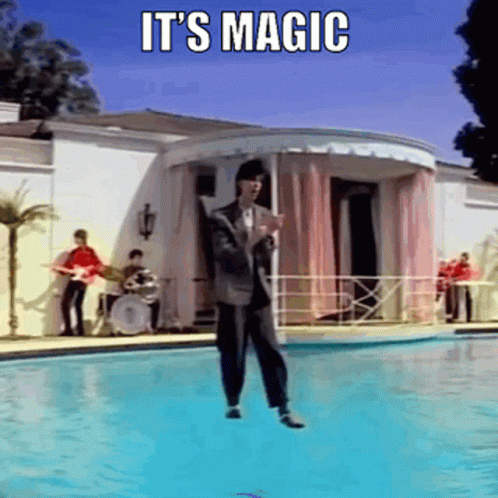Their greatest hits are magical and easy to memorize...
Magical? Perhaps.
Magic?

I THINK NOT!
Their greatest hits are magical and easy to memorize...

Magical? Perhaps.
Magic?

I THINK NOT!
Yes, but I wouldn’t be able to guess in what way the adventure would be different. If I could, you would be absolutely right about heroes being interchangeable and the plot dwarfing characterization.So, will the events unfold differently if my PC is a Folk Hero Rogue, rather than a Noble Paladin with the Oath of the Crown?
Not at all. You run the AP with different characters and different players, you are going to get meaningful differences.You're arguing about the color of the scenery, saying maybe some of the colors could be changed, but still acknowledging that the scenery is otherwise the same.
Doesn’t that mean the problem is you?No, APs are not meant as outlines. That's not how they sell themselves.
@Crimson Longinus , @FrogReaver , @Lanefan , @EzekielRaiden and @anyone else who believes in the concept of "improvised setting (possibly including NPCs and their dispositions...unclear) content generation as a state of quantum superposition", can you explain why are the following things not in a state of superposition?
* The 20 listed NPCs/Monsters on your Wandering Monster List every time Wandering Monsters are rolled in a dungeon.
* The 20 listed Hex Encounters every time you roll for Random Encounters in Hex 2b (or whatever).
* The NPC/Monster disposition when you roll Reaction or Morale.
* The 20 listed Town Encounters every time you roll for Random Encounters in Town x.
* The nature of (location and backstory and disposition) of the Innkeep, the Member of The Watch, the Travelling Peddler, the Caravan Guard or Merchant whenever play goes off backstory script to a location or person (prodded by players) that wasn't fleshed out prior (whether you make some kind of roll to procedurally generate the content in the moment or you just "GM's Choice" it and frame the place/character in because the player has prodded it).
* The location and nature of every piece of set dressing/color/NPC characterization that is suddenly invoked, poked, prodded, or otherwise required to suddenly materialize from the void of the shared imagined space as the conversation of play dictates.
How are any of these things not in this verboten state of "unestablished to ass-pull" (whether procedurally generated as required or GM's Choice) that is being (and has been since I was little...this is a 30+ year rodeo of this claim) but a player's memory is?
I don't remember them arguing against quantum collapsing within the progress of the game being bad, but rather about particular types of quantum collapsing. Such as:
* A character trying to see what's down the hallway and checking to see if it was a particular type of monster the player wanted, and it being so if they rolled a success.
* A character trying to see if what they heard in the center of the hex was a particular thing the player wanted, and it being so if they rolled a success.
* A character trying to see if they read the monsters emotions correctly to be the particular one the player wanted, and it being so if they rolled a success
* etc...
seemed very different in a variety of ways (what the players had to consider when playing, the nature of causality, divisions of authorial responsibility, gamey-ness, etc...) from the other ways the quantum fields could collapse.
They are in "quantum superposition." Not that I use such random tables, but it applies equally to things the GM just decides. Why would any of this be an issue? The issue is solely with mechanics that allow the player to affect things that are not within their character's power to causally affect. Not that having such mechanics is necessarily a problem, but it is different than not having them.@Crimson Longinus , @FrogReaver , @Lanefan , @EzekielRaiden and @anyone else who believes in the concept of "improvised setting (possibly including NPCs and their dispositions...unclear) content generation as a state of quantum superposition", can you explain why are the following things not in a state of superposition?
* The 20 listed NPCs/Monsters on your Wandering Monster List every time Wandering Monsters are rolled in a dungeon.
* The 20 listed Hex Encounters every time you roll for Random Encounters in Hex 2b (or whatever).
* The NPC/Monster disposition when you roll Reaction or Morale.
* The 20 listed Town Encounters every time you roll for Random Encounters in Town x.
* The nature of (location and backstory and disposition) of the Innkeep, the Member of The Watch, the Travelling Peddler, the Caravan Guard or Merchant whenever play goes off backstory script to a location or person (prodded by players) that wasn't fleshed out prior (whether you make some kind of roll to procedurally generate the content in the moment or you just "GM's Choice" it and frame the place/character in because the player has prodded it).
* The location and nature of every piece of set dressing/color/NPC characterization that is suddenly invoked, poked, prodded, or otherwise required to suddenly materialize from the void of the shared imagined space as the conversation of play dictates.
How are any of these things not in this verboten state of "unestablished to ass-pull" (whether procedurally generated as required or GM's Choice) that is being claimed as exclusive to Story Now games (and has been since I was little...this is a 30+ year rodeo of this claim) but a player's invoking their PC’s memory is?
